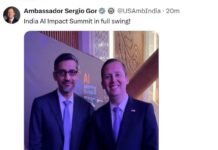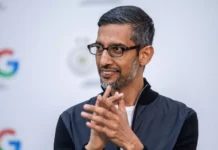AHMEDABAD: US President Donald Trump on Monday subtly asked India to remove trade barriers, eliminate red-tape and taxes to boost trade with his country while saying commerce between the two nations has increased by more than 40 per cent since he came to power.
Trump, who is on a two-day visit to India, has already indicated that no trade deal of significance would be signed during the visit. The President during his presidential campaign days was one of the critics of offshoring to India by US infoteh firms which he felt was creating jobs losses in US.
“A booming America is a great thing for India and it’s great for the world and that’s why we are so happy to announce that we have had the greatest economy ever in the history of the United States of America and we have proved that the best way to attract jobs and opportunity is to reduce burdens of business, knock down barriers to new investment and eliminate unnecessary bureaucracy, red-tape regulation and taxes. Prime Minister Modi has already made significant reforms…the world looks forward to even more rapid improvement in India’s business climate”, the President said while accepting a grand welcome at the Motera Cricket Stadium here.
“Prime Minister Modi has already made significant reforms in your country as you very well know, he has done it at a record pace,” Trump said.
“Over the course of my visit, Prime Minister Modi and I will also discuss our efforts to expand the economic ties. We will be making very, very major trade deal”, the US President said. Trump did not elaborate on what’s coming on this front, but hinted at both countries working towards a deal at a future date.
“We are in the early stages of discussion for an incredible trade agreement to reduce barriers of investment between the United States and India and I am optimistic that the Prime Minister and I can reach a fantastic deal which is great for both the countries”, Trump said.
“Modi is a tough negotiator,” Trump added.
Prior to his current and maiden visit to India, Trump in US said he likes Modi ‘a lot’ but the US is not treated well by India and that he would save the big “trade deal” with India for a later date, without giving any time-frame of the deal. “I don’t know if it (the deal) will be done before the (US) elections, but we’ll have a very big deal with India,” the President had said. This indicated that this time bilateral trade between the US and India might not be on the cards.
In September last year, India increased tariffs on 28 American products, including almonds, walnuts, and apples, as well as US steel. India was also angered by Washington’s refusal to exempt India from steel and aluminium tariffs last year. India mostly exports gems, pharmaceuticals, machinery and vehicles to the US.
In August , a top US Senator Lindsey Graham told a US channel that “when you look at the world tariff regime; 67 per cent of all tariffs in the world disadvantage America. There’s a higher tariff on American products in the country in which we do business with. India is the worst.”
The Union Budget 2020 was also seen brining in protectionist measures. The Budget has made changes to the Customs Act to insert certain unspecified obligations on the importer while expanding the ambit of preventing injury to domestic economy due to uncontrolled imports from just gold and silver today to any other goods in the future.
“It has been observed that imports under FTAs are on the rise. Undue claims of FTA benefits have posed a threat to domestic industry. Such imports require stringent checks. In this context, suitable provisions are being incorporated in the Customs Act,” Finance Minister Nirmala Sitharaman had said in the Budget speech.
The protectionism emanated from India’s decision on boosting ‘Make in India’ stand pushing the philosophy of curbing imports to encourage local manufacturing of merchandise in order to further the Make in India programme.
“A new chapter is being incorporated in the Customs Act to provide an enabling provision for administering the preferential tariff treatment under the trade agreements. The proposed section seeks to specifically provide for certain obligations on the importer and prescribe for time bound verification from exporting country in case of doubt. Pending verification, preferential tariff treatment will be suspended and goods shall be cleared only on furnishing security equal to differential duty. in certain cases, the preferential tax treatment may be denied without further verification,” stated the customs notification elaborating Sitharaman’s comment in the budget speech.
The cumulative US-India trade in goods and services ($110.9 billion) for the first three quarters of 2019 increased 4.5 per cent. The US exports and imports had risen at four per cent and five per cent, respectively, according to a report by US-India Strategic and Partnership Forum (USISPF). IANS







